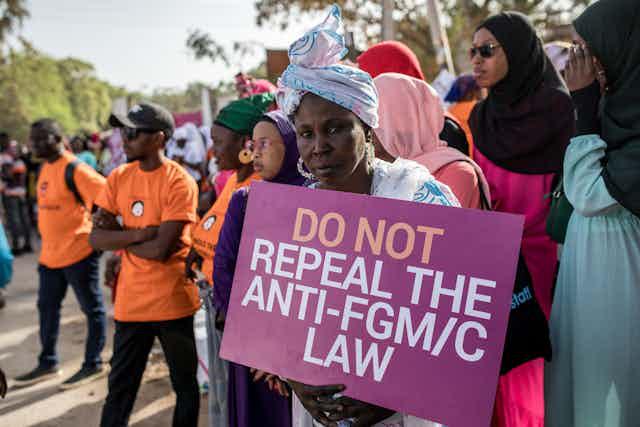By: Dawda Baldeh
In recent months, The Gambia has seen a national debate regarding the appropriateness of Female Genital Mutilation/Circumcision (FGM/C).
The discussions have largely centred on the personal views of stakeholders involved in the debate.
A bill aiming to decriminalize the ban on FGM has recently passed the second reading in the National Assembly, further intensifying the debate, with some advocating for expert opinions to safeguard women and girls from the practice.
A group of experts, comprising gynaecologists and doctors specializing in women’s health, have issued a collective statement. They have called upon the members of the National Assembly to uphold the law prohibiting Female Genital Mutilation.
“As gynaecologists and doctors working in women’s health, we feel compelled to contribute to the ongoing debate surrounding the appropriateness of female genital cutting (FGC) in The Gambia,” they said in a statement.
These seasoned health experts believe that evidence-based medicine should guide people’s understanding and approach to this issue.
“Therefore, we urge lawmakers to maintain the current laws on FGM to prevent significant harm to the anatomy and mental health of women,” the statement continued.
It is crucial to recognize that in The Gambia, FGM is conducted by individuals without formal medical training. Experts indicate that these procedures frequently occur without anaesthesia, utilizing rudimentary tools, and in settings that fail to adhere to basic health and safety protocols.
“This poses immediate risks, such as significant bleeding, injury to vital organs like the urethra, infection, and fever.
“Numerous systematic reviews and meta-analyses have been conducted on the health effects of FGM, and they consistently demonstrate both immediate and long-term complications,” the experts said.
“Immediate complications include bleeding, acute inability to urinate, and swelling around the genital area.
“Long-term consequences include genital scarring, neuromas of the clitoris causing severe pain, and the development of large masses such as epidermoid inclusion cysts and sebaceous cysts.
“Furthermore, FGM has been associated with urinary tract symptoms, impaired sexual function, and an increased risk of complications during childbirth, such as haemorrhage, caesarean section, stillbirth, and excessive bleeding.
“Psychological problems, including anxiety, flashbacks, and post-traumatic stress disorder, have also been reported in women who have undergone FGM.
“Some individuals have argued that type 1A FGM (cordectomy or removal of the prepuce) is harmless and even beneficial and should be practised within the healthcare system in The Gambia, similar to male circumcision.
“However, there is a lack of robust research supporting the benefits of type 1A FGM.
“Performing this procedure on children carries significant risks, even in a hospital environment, due to the small size of the external genitalia and the difficulty in delineating anatomical structures.
“Clitoral hood reduction surgery (cordectomy) falls under the umbrella of female genital cosmetic surgery.
“While consenting adult women may choose to undergo this procedure, we align ourselves with the statement of the American College of Obstetricians and Gynaecologists (ACOG) that concludes that clitoral hood reduction surgery is not medically indicated, poses substantial medical risks, and its safety and effectiveness have not been established.”
Additionally, they expressed concerns about the strain that the practice of cordectomy in public health facilities would place on an already burdened healthcare system.
Diverting resources from other life-saving services to cater to cordectomy may lead to public harm in the long run.
“As healthcare professionals, we have a fundamental ethical obligation to “not harm.”
Performing FGM would be a violation of this principle,” the gynaecologists continued.
This statement is endorsed by the following:
1. Dr. Patrick Idoko Senior Consultant Gynaecologist
2. Dr Hassan Azadeh Senior Consultant Gynaecologist
3. Dr Mustapha Bittaye Senior Consultant Gynaecologist and Director of Health
Services
4. Dr Matthew Anyanwu Senior Consultant Gynaecologist
5. Dr Jose Green Harris Specialist Gynaecologist and Head of Clinical Services at
Kanifing General Hospital
6. Dr Awa Jah Specialist Gynaecologist
7. Dr Fatoumata Jarjusey Specialist Gynaecologist
8. Dr Kebba Gassama Specialist Gynaecologist
9. Dr. Dado Jabbie Specialist Gynaecologist and Head of Department at Bundung
Maternal and Child Health Hospital
10. Dr. Barrister Babanding Daffeh Senior Medical Officer and Head of Department at
Kanifing General Hospital
11. Dr Lucas Jatta Senior Medical Officer Brikama District Hospital
12. Dr Elizabeth Innis Gynaecologist
13. Dr Awa Sanyang Gynaecologist




